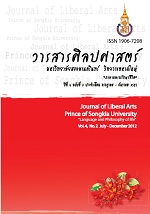An Investigation of English Listening Strategies Used by Thai Undergraduate Students in Public Universities in the South
Keywords:
Listening comprehension strategiesAbstract
This survey research focused on investigating listening comprehension strategies used by undergraduate students, the differences in strategy use between more and less able ones and strategy use across universities. The subjects (n=146) were third-year English major students with a low intermediate level of listening proficiency, from four public universities in Songkhla, Thailand. Data were collected using IELTS Practice Test 7 to measure the students’ listening ability and the Listening Comprehension Strategies Questionnaire adapted from the Strategy Inventory for Language Learning (Oxford, 1990). Findings indicated that the most frequently used strategy by all subjects was using background knowledge of grammar to help in listening (cognitive strategies; =4.33), while the least frequently used strategy was physically acting out what they heard to help memorize it (memory strategies;
=2.45). On the whole, no significant differences were found in either individual strategy use or strategy category use between more and less able students (t = 0.62, p>0.05) and among the groups of students across universities. However, in detail, significant differences were found in three individual strategies, namely using prior knowledge (cognitive strategies), listening to English news (metacognitive strategies) and practicing listening and speaking with friends (social strategies). Significant differences in individual strategy use across the universities were also found: taking notes (cognitive strategies) and emotion control (affective strategies). Frequencies of strategy use in the more able students were higher than that in the less able ones. Implications are that more strategy training, especially cognitive and metacognitive strategies, should be provided to the subjects. Exposing oneself to real language use in media and communication with friends and others should also be encouraged. Activities for training in the use of note-taking and emotion control should be included, especially for the less able ones.
Downloads
How to Cite
Issue
Section
License
The authors retain the copyright to their article but the Journal of Liberal Arts, Prince of Songkla University reserves the exclusive rights to first publication.






